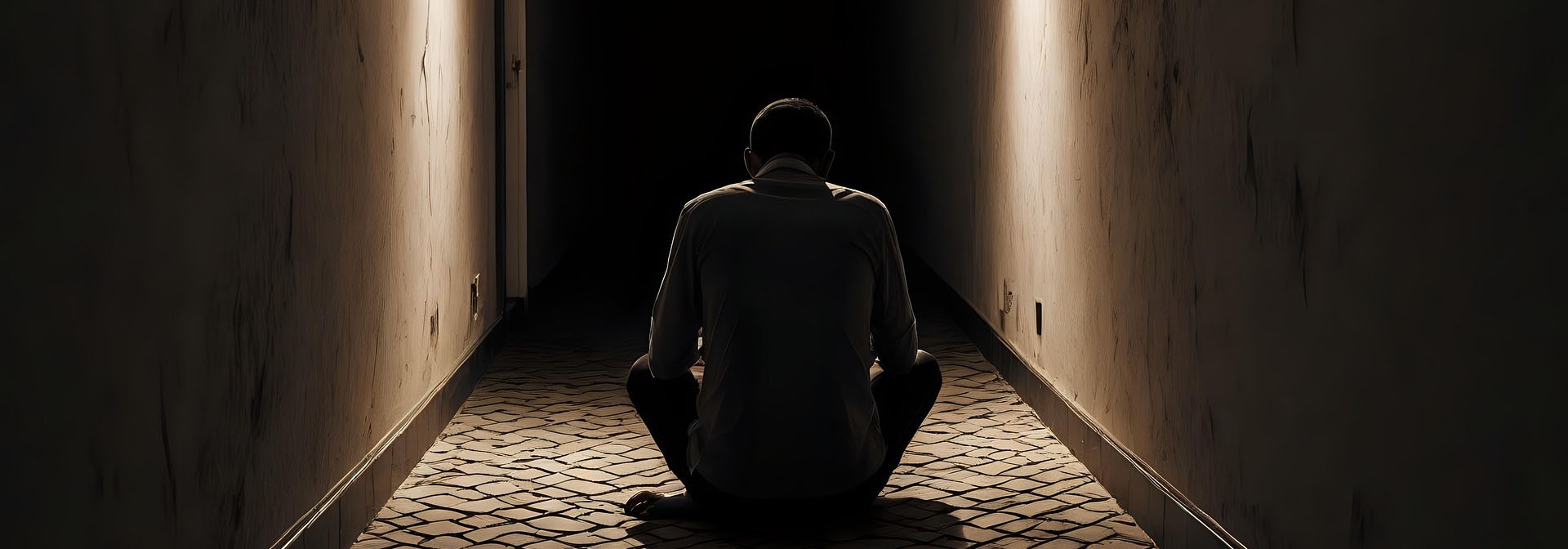The alarm went off at seven, shrill and merciless. I slammed my hand down on the clock, but the sound had already worked its way into my skull. I lay there, staring at the ceiling, where a spider had spun a little web in the corner. The September light squeezed through the curtains, sharp and cold.
First day of school. Sixteen now. Year Eleven. Exams, pressure, all those looks from teachers and relatives that said this year matters. The thought of walking into that building again—crowded hallways, buzzing chatter, teachers already with their raised eyebrows—hit me in the chest like a brick.
It was like my lungs forgot how to be lungs. I tried to breathe in but only managed shallow, stuttering gulps. My heart bolted, running miles ahead of me while I stayed stuck under the covers. My mouth sand-dry but my hands slippery with sweat. I kicked the duvet off, but then I dragged it back, desperate for comfort even as it smothered me. I was both freezing and burning.
My vision blurred, then narrowed, as if I was peering down a tunnel. My ears rang, an unbearable static. I sat up, clutching my chest, whispering I can’t do this. I can’t go back.
The room twisted around me. Posters on the wall warped and leaned like they were sneering. I pressed my fists into my eyes, trying to stop it. My throat closed, like someone was tightening invisible hands around it. Each breath felt stolen, half-finished.
Some part of me knew: This is a panic attack. You’ve had them before. But knowing didn’t help. My body screamed louder than reason.
Pins and needles ran down my legs, fizzing until my toes went numb. My stomach knotted and cramped. I bent forward, pressing my forehead into my knees, shaking.
Breathe in, breathe out. Count. I tried. One, two, three… but every inhale snagged halfway, like air was leaking from a torn balloon. My skin felt like a cage, and I wanted out of it.
Hot tears burned my eyes. I hadn’t planned to cry, but they came anyway, sliding down and soaking my pillow. My sobs tore out of me, jagged and ugly, mixing with my ragged gasps.
The quiet of my room only made it worse. The tick of the clock sounded ominous, the drip from the bathroom tap down the hall a hammer in my head. Every sound was magnified against the backdrop of my heaving chest.
I curled tighter. Time lost all sense—minutes felt endless, or maybe only seconds passed. All I knew was panic: the pounding heart, the dizziness, the certainty that I couldn’t face the world outside this door.
Eventually, the tide shifted. My heart slowed from a gallop to a heavy trot. My breath stretched further into my chest, though my throat still ached. I sat up again, trembling, my body as limp as if I’d just run a race.
Then Mum’s voice carried up the stairs: “Rick! Breakfast’s ready! Don’t be late on your first day!”
I flinched. Her words were so normal, cheerful, but they landed on me like weights. First day. Don’t be late. The reminder I didn’t need. I wiped my face on my sleeve and stared at my door.
I felt wrung out, like a towel twisted too tight. My head throbbed, dull and insistent. The panic hadn’t gone, not really—it crouched somewhere inside me, ready to leap. But at least I could breathe again. That had to count.
I swung my legs out of bed, pressing my feet onto the cold floor. My body still trembled, but I pushed myself upright. I shuffled to the window, tugged the blind up.
Outside, life carried on. Kids in uniforms trudged down the street, shoulders hunched against the crisp September air. A bus growled at the corner. A neighbour’s dog barked. The world didn’t care that I’d just been swallowed by a storm.
I pressed my palm to the glass, wishing I could stay hidden here, behind this window, where it was quiet. No demands. No stares. No pretending to be fine.
But then another voice whispered inside me: You’ve done this before. You’ll survive today too.
I took another shaky breath. It wasn’t perfect, but it was air. I grabbed my crumpled uniform from the chair and pulled the shirt on. My skin was still damp, the fabric clinging uncomfortably, but I forced myself through it. I draped my tie loosely around my neck, too tired to knot it yet.
Downstairs, the smell of toast floated up. Mum would be waiting with that careful brightness in her eyes, ready to pretend she didn’t notice the redness in mine.
I glanced in the mirror. My face looked wrecked—red blotches, swollen eyes—but I was upright. I touched the door handle. Hesitated. Then pushed it down.
The hallway smelled faintly of laundry powder, ordinary and safe.
One step at a time, I told myself. Down the stairs. Out the door. Onto the bus. Maybe the panic would come again. Maybe it wouldn’t. But right now, I was moving.
And that had to be enough.



